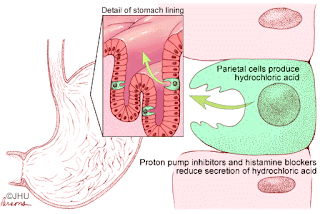FDA Adds Eight Drugs to Watch List
Medscape reports on eight drugs added to FDA's watch list.
All eight are interesting for the secondary effects of which they are accused.
However, two in particular stood out for me.
Two that many, many, many people take.
They have become associated with increased incidence of pneumonia.
Why?
One hypothesis is that by reducing your stomach acidity, you are no longer protected from invasion/colonization by unwanted microbes. Once established in your body, you breathe them down into your lungs.
Another hypothesis is that PPIs may reduce the acidity of the upper digestive tract, resulting in microbial colonization of the larynx, esophagus and lungs.
So you see, whether postulate number one or two, the problem is thought to be that PPIs are diminishing a front line immune defense and allowing unwanted microbes to become established in our bodies.
To glimpse just how big a nightmare the secondary effects of PPIs could be, in 2008 113 million prescriptions for PPIs were filled at a cost of $13.9 billion.
A most excellent explanation of PPIs and their several pitfalls published by the National Institutes of Health here.
What other pitfalls?
It was probably in the mid '00s that PPIs became widely discussed as a link to fractures. That's when I recall a flood of articles on the topic.
Low stomach acid (achlorhydria) has been associated with bone fracture for much longer, however.
The problem is poor absorption of calcium.
Generally, lower your stomach acidity, the less calcium you will dissolve and absorb.
This is particualry problematic with calcium carbonate, the cheapest and most widely used calcium supplement. The stuff is chalk. Makes up 4% of the earth's crust. No wonder it's cheap.
As your stomach acid lessens, calcium carbonate is less and less soluble.
So what to do? Aside from dropping PPIs and getting a normal stomach acidity?
Calcium citrate will dissolve where carbonate will not. It is possible that everyone on PPIs should also be taking calcium citrate.
As an aside, PPIs will also deplete vitamin B12.
That pearl comes from one of the most useful books in my office.
Please Dr. Pelton. We need a new adddition!
Wine and vinegar
Vinegar is, of course, acidic. It has traditionally been used as a remedy for stomach ache.
Consider that: 113 million prescriptions for PPIs and who knows how many Tums/Rolaids etc. every year to tamp down acid because of stomach pain attributed to excessive stomach acid. Yet a traditional remedy is adding more acid. How can this be?
The answer is that some people actually need more acid and by medicating themselves into an even lower acid state are worsening their condition.
That is what I most often find.
We have been given wise dietary habits through our cooking traditions. Types of foods, methods of preperation, combinations of foods in a dish or meal.
Two such are vinegars and wines.
Salad with vinaigrette to start a meal adds acidity that aids digestion.
Wine with the meal adds acidity to aid digestion, as wine is also acidic.
In marinades and sauces, wine and vinegar contribute to dietary acidity which aids digestion.
And what happens to wine that has too little acidity?
Same as us. It becomes prone to infection.
Pitfall Two
Infection by pneumonia due to PPI use started this post.
Infection on the other end by Clostridium dificille will end it.
PPI use has been linked to increased clostridium infection.
They have been found to double infection rates.
Healthy people shouldn't normally be troubled by this organism.
A course of antibiotics will increase your chances of infection, just as PPIs will.
Stomach acid is a barrier to infection and colonization of pathogens.
Antibiotics are indescriminate and kill off pathogens and desirable, necessary, life sustaining, friendly microbes that reside in us, as I've covered here.XXXXXXXXX
Our traditional diets provided us with friendly microbes through fermented foods.
How often do we eat fermented foods now?
Maybe a yogurt occasionally.




No comments:
Post a Comment